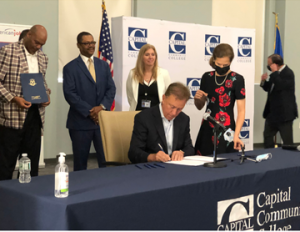
Watch a short video of the Press Conference
(HARTFORD, CT) – Governor Ned Lamont today held a bill signing ceremony at Capital Community College in Hartford to commemorate the adoption of a new law enhancing his ongoing efforts to provide workforce development opportunities for students and workers, support job growth, and help position Connecticut as a leader in the IT, AI, and Industry 4.0 economy.
During the ceremony, the governor announced the launch of Connecticut’s first regional sector partnership, the Capital Area Tech Partnership. This initiative will consist of over 50 technology companies and was made possible as a result of a partnership between the Connecticut Office of Workforce Strategy, Capital Workforce Partners, MetroHartford Alliance, the regional IT Tech business and industry, and training and education partners.
Regional sector partnerships are a best-practice in workforce development and were identified as a top priority in the Governor’s Workforce Council Strategic Plan 2020. In a regional sector partnership, businesses that have common workforce needs work together to articulate career pathways and collaborate with training providers to create training programs that are aligned to these pathways. Regional sector partnerships are employer-driven and use little to no state funding. No state funding has been provided to date for the Capital Area Tech Partnership.
“Connecticut’s regional sector partnerships will create new career pathways for thousands of good-paying jobs that are currently available in IT, advanced manufacturing, and other industries in the state,” Governor Lamont said. “By upskilling and reskilling our residents, we can prepare them to capitalize on these great jobs to fuel growth in the Connecticut economy now and well into the future.”
New training programs aligned with the Capital Area Tech Partnership are currently under development. In these training programs, participants will receive skills-based training, leading to entry-level employment in high-demand occupation clusters such as IT support, cloud services, data management, cybersecurity, and more.
“We are excited to work with technology business leaders to meet their IT workforce needs through a skills-based training approach,” Alex Johnson, president and CEO of Capital Workforce Partners said. “Engaging marginalized, underserved populations is a priority, especially as these populations were disproportionately impacted by the COVID-19 pandemic. The programs will include outreach and training to engage diverse populations and help them access employment and lifelong learning opportunities.”
“As leaders in our region’s technology sector, we know how critical it is for us to train and develop our future workforce,” Martin Guay, vice president of business development for Stanley Black & Decker and one of the founding leaders of the Capital Area Tech Partnership, said. “Our efforts to support the Capital Area Tech Partnership is another important step in helping close the skills gap and build digital-skills training programs that will credential students for career opportunities in Connecticut.”
“Connecticut’s Workforce Strategic Plan 2020 envisions that every Connecticut resident has access to meaningful career pathways and the support needed to fulfill their career aspirations, and every business in Connecticut has access to a skilled workforce,” Connecticut’s Chief Workforce Officer Kelli-Marie-Vallieres said. “With thousands of IT job openings, there is a sense of urgency by the state of Connecticut to engage target populations and accelerate access to opportunities that translate to high-quality jobs.”
The legislation that Governor Lamont signed – Public Act 21-199, An Act Concerning Various Revisions and Additions to the Statutes Relating to Education and Workforce Development – makes several changes regarding education policy to help improve equity in education and improve post-secondary outcomes and reflects the governor’s vision of “post-secondary for all.” Post-secondary for all means that all students should be prepared for and have the opportunity to attend a high-quality post-secondary program, which includes apprenticeship programs, certificate programs, and degree programs. These provisions of Public Act 21-199 were initially proposed earlier this year by Governor Lamont in Senate Bill 881.
Two key provisions of Public Act 21-199 are:
- Changes to improve access to and equity in high-quality coursework in high school, such as AP, IB, and ECE courses. While high rates of students in Connecticut currently take such courses, there is a stark gap based on family income and race and ethnicity, even when comparing those who otherwise have similar standardized test scores. Improving access to and equity in high-quality coursework is important because students who are exposed to advanced coursework in high school are more likely to succeed in post-secondary education.
- A requirement for school districts to adopt policies to improve completion rates of the Free Application for Federal Student Aid (FAFSA). The FAFSA is the primary method by which need-based financial aid is provided – including federal Pell grants, the state’s Roberta Willis Scholarship, and the state’s PACT program. Students who complete the FAFSA are more likely to go on to enroll in and eventually complete post-secondary education. The FAFSA will become significantly shorter and easier to fill out next year, which should help improve completion rates.
“This new law will improve equity and outcomes for our students,” Governor Lamont said. “My goal is that all high school graduates in Connecticut should be prepared for and have the opportunity to attend high-quality, post-secondary programs, and the provisions of this legislation will that make that goal a reality for more of our students.”
“Public Act 21-199 takes many bold steps that build on our ongoing efforts to improve postsecondary outcomes for all with an increased focus on FAFSA completion rates and expanded access to rigorous, college-level coursework,” Connecticut Education Deputy Commissioner Desi Nesmith said. “Together with partners in higher education, business, industry, state agencies, and community organizations, we will continue to advance Governor Lamont’s workforce development policies so that our students graduate prepared to compete for jobs of today’s 21st century economy.”
- Twitter: @GovNedLamont
- Facebook: Office of Governor Ned Lamont
